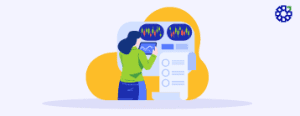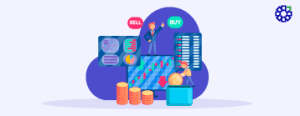What is Futures Trading?
- 21st July 2025
- 11:00 AM
- 9 min read
Are you aware that the number of derivatives investors in India has increased to 96 lakh in FY25? Well, futures trading is one of the key reasons behind it as it is an advanced form of derivative trading, and many beginners have doubts about how it works and how to get started with it.
Without even owning a single share, this investment option can help you make a profit by predicting market prices. Curious how? This blog clears all of your confusion about futures trading meaning by explaining how it works and how you can trade.
What Does Futures Trading Mean?
Futures trading involves buying or selling contracts that require the trader to transact an underlying asset at a fixed price on a future date. These contracts can be based on stock indices, currencies, or commodities like oil, gold, and agricultural goods.
Commonly used for both hedging and speculation, futures trading helps manufacturers and farmers protect against price volatility, while speculators aim to profit from market swings. Though futures trading offers the potential for high returns, it also carries significant risks.
To succeed, one must gain in-depth knowledge, experience, and adopt proper risk management strategies to navigate this dynamic financial market.
How Does Futures Trading Work?
After understanding the futures trading definition, you must know how it works. While it can multiply your profit, futures trading also carries high risks. On average, each futures trader has lost INR 1,10,069 in FY25. That is why you need a conceptual understanding of how futures trading works.
Futures contracts are standardised agreements that specify the quality, quantity, and delivery terms of an asset. These contracts legally bind the buyer to purchase and the seller to deliver the asset at a predetermined price on a future date, regardless of market fluctuations. Each contract comes with a set expiry date, often as short as one month.
Traders use futures contracts either to hedge existing positions or to speculate on price movements. Since they are traded on regulated exchanges, participants must deposit a margin, typically a small percentage of the contract’s total value, as collateral.
You can understand how futures trading works more easily with the help of an example.
Example of Futures Trading
Suppose you have bought stock futures of 100 shares for INR 100 from company X with a specific margin amount. The stock futures are about to expire after one month.
On the expiration date, the two possible outcomes will be:
- The stock price of X has surged to INR 150. In this instance, you can exercise the contract and buy those 100 shares at INR 100 while making a profit of INR 50 per share.Your total profit will be: INR (5000 – margin money paid)
- If the price comes down to INR 80 per share, you still have to buy it for INR 100, bearing a loss of INR 20 per share.
Your total loss will be: INR (2000 + margin money paid)
The profit will be deposited into your trading account after deducting some commissions and fees.
When you settle a futures contract before the expiry date, your gains and losses are calculated after they are adjusted to the margins you have paid.
How to Trade in a Futures Contract?
Since you have understood how futures trading works with an example, you can get started with it. Follow these steps below to trade in a futures contract:
-
Analyse Your Risk Appetite
First, analyse the risks associated with futures trading. Since futures are risky investment options, you must evaluate your risk appetite. You must know how much loss you can afford and how much it can affect your portfolio.
-
Select a Market to Trade
Selecting the right futures market is crucial for your risk appetite. If you have a lower risk appetite, you should invest in a less volatile market like gold or silver. Contrarily, if you are a short-term trader and want to take higher risks, you can go for highly volatile indices.
Download the PL Capital Group – Prabhudas Lilladher application to use its back-test strategies to choose a market to trade in futures.
-
Open a Trading Account
Opening a trading account with a reputable broker is a must to start trading in futures. Log in to their trading platform after completing the registration with a broker. You should check the fees and other charges while opening an account.
For instance, PL Capital allows you to open a trading account with zero annual maintenance charges.
-
Deposit the Margin Money
Deposit the margin money with the broker, which is required for futures trading. This margin money is between 5% to 10% of the contract size. The broker will deposit it with the exchange. The exchange will hold the funds as collateral for the entire period you have the contract.
-
Place Your Trade
Place your first order with your broker by letting them know the size of the contract and the numbers you want, the strike price and the expiry date. You have to choose a contract from the various contracts provided by the broker.
-
Settling the Contract
Lastly, you have to settle your futures contract. You can settle the contract at the time of expiry or before its expiry.
How Futures Trading is Different from Other Financial Instruments?
Although equities and mutual funds are well-known to most people, trading futures requires a whole different strategy, which is described below:
-
Expiration
In contrast to securities like stocks and bonds, futures contracts have a set expiration date. You must close or roll over your position before this date.
-
Standardisation
The conditions of delivery, size, and expiration date of futures contracts are all standardised. This standardisation makes the trading process easy and ensures transparency.
-
Margin
Investors must provide a margin for futures trading, which serves as collateral and demonstrates both parties’ commitment. Futures contracts differ from other financial instruments because of this margin.
-
Cost
Compared to other instruments, futures trading commissions are lower. This can help you make more profit.
What are Futures Markets and Types of Futures?
Understanding the futures market is also crucial since it allows you to make better decisions while making trades. Indices, currencies, debt, metals, and agricultural items are some of the financial and commodity-based futures that may be traded in the market. Below are some common types of futures contracts that you can trade:
-
Currency Futures
Currency futures allow you to trade on the exchange rate of real and digital currencies. Some common currency pairs in India are USD/INR, EUR/INR, GBP/INR, and many more.
-
Financial Futures
Financial futures consist of interest rate and index contracts. While index futures expose investors to the performance of particular market indexes, interest rate futures enable trading based on the interest rates of financial instruments.
-
Energy Futures
This type of contract gives you access to common energy products used by governments and businesses. Oil and gas are some of the common examples of these products.
-
Grain Futures
Grain futures contracts involve processed soybeans, as well as raw grain materials used for animal feed and commercial processing into other products.
-
Metal Futures
Using these contracts, you can make predictions about metals used in construction and manufacturing.
-
Food and Fibre Futures Contract
Food and fibre contracts expose investors to the pricing of dairy products, along with some agricultural products. These products are grown rather than mined or extracted.
-
Livestock Futures
Contracts for livestock futures deal with the cost of producing and distributing meat from live animals.
Final Thoughts
Before you start trading in futures, you must have a vast knowledge of all its concepts. The futures market carries a significant level of risk. The overall understanding and clarity of this concept help you to overcome the risk and generate higher returns.
You can use the PL Capital application and its trading platform to start futures trading. PL also offers you to use technical analysis and trading alerts with its TradeClue platform to trade effectively in the futures market.
Frequently Asked Questions
1. What are the advantages of futures trading?
One of the primary advantages of futures trading is high leverage. These contacts only require a fraction of the total investment as a margin. Additionally, futures markets are generally highly liquid due to the large volume of trade.
2. Is futures trading better than stocks?
Although it carries huge risks, futures trading is better than stocks. You can manage assets with a small quantity of cash by using high leverage when trading futures rather than stocks.
3. What is the difference between futures trading and margin trading?
Margin enables you to enter a position for a greater market stake, while you have to pay the margin up front into an escrow account while trading futures. Furthermore, the margin requirement for futures trading is far smaller than that of margin trading in equities, which calls for an upfront payment of 20% to 25%.





